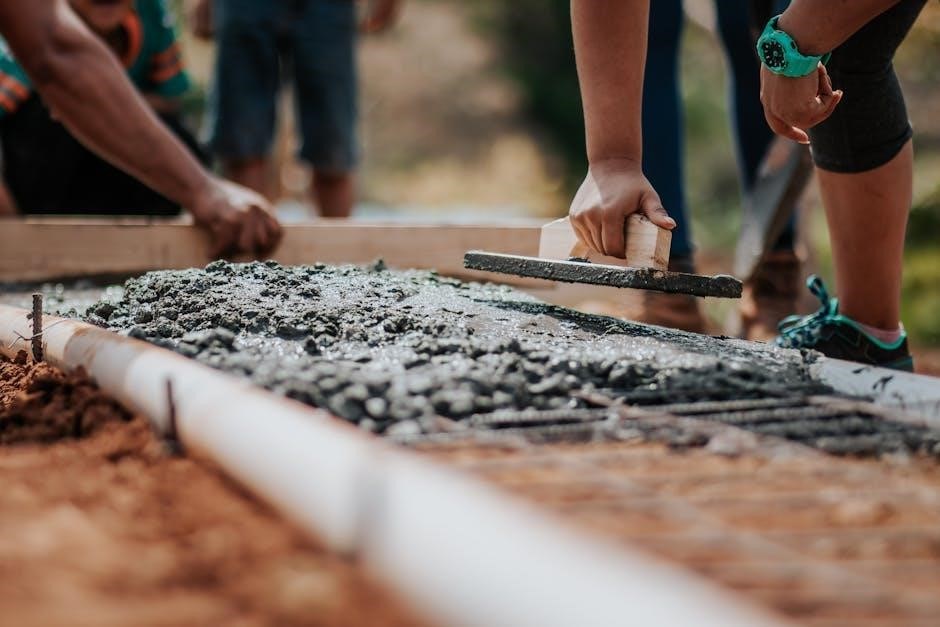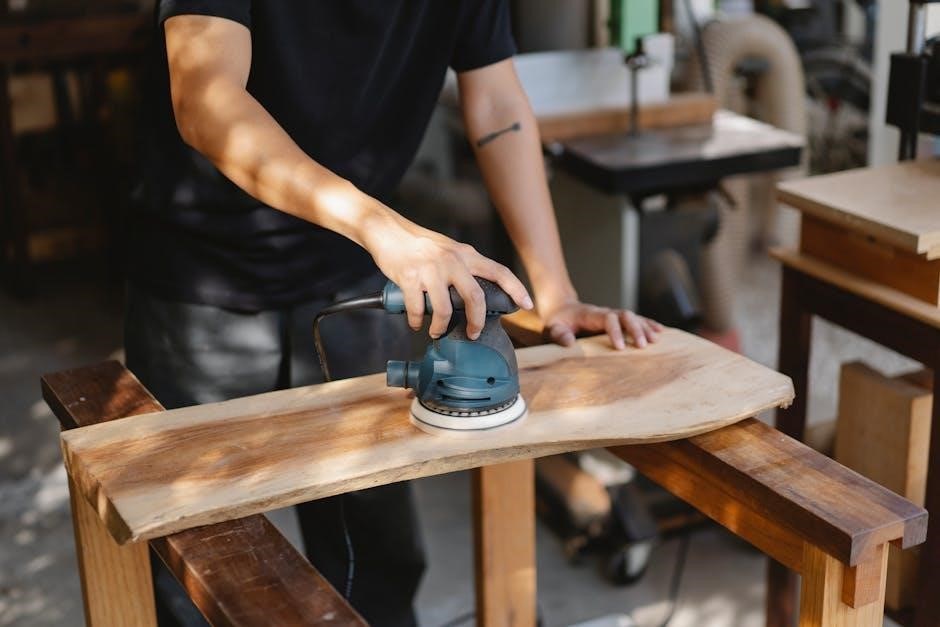The FDNY Probie Manual is a foundational guide for probationary firefighters, providing critical insights into department protocols, safety procedures, and expectations for new recruits. It ensures a smooth transition into active duty.
1.1 Overview of the Manual’s Purpose
The FDNY Probie Manual serves as a comprehensive roadmap for probationary firefighters, outlining essential protocols, safety measures, and operational expectations. Its purpose is to ensure recruits understand their roles, responsibilities, and the high standards required by the FDNY. The manual covers critical topics such as emergency procedures, equipment usage, and health protocols, providing a structured framework for professional development. It also emphasizes continuous learning and adherence to ethical standards, preparing probationary firefighters for the challenges of active duty while ensuring public safety and department integrity.
1.2 Importance for Probationary Firefighters
The FDNY Probie Manual is indispensable for probationary firefighters, as it provides clear guidance on departmental protocols, safety standards, and professional expectations. It bridges the gap between training and real-world scenarios, ensuring recruits are well-prepared for the challenges of firefighting. The manual emphasizes the importance of adhering to safety protocols, understanding equipment, and maintaining ethical conduct. By following its guidelines, probationary firefighters can develop the skills and confidence needed to perform effectively, ultimately contributing to the safety of both themselves and the public they serve.
Training and Development
The FDNY Probie Manual outlines a comprehensive training program, focusing on emergency procedures, equipment usage, and hands-on exercises to ensure firefighters are well-prepared for real-world scenarios.
2.1 Structure of the Training Program
The FDNY Probie Manual outlines a structured training program divided into phases, starting with classroom instruction, followed by hands-on drills, and culminating in live fire simulations. Recruits learn fire behavior, rescue techniques, and equipment operation through a mix of theoretical and practical exercises. The program emphasizes teamwork, safety protocols, and decision-making under pressure, ensuring probationary firefighters are prepared for real-world emergencies. Continuous evaluations and feedback from instructors help refine skills, building confidence and competence for the challenges ahead.
2.2 Key Topics Covered in Training
The FDNY Probie Manual details essential training topics, including fire dynamics, rescue operations, and equipment usage; Trainees learn about communication strategies, emergency medical procedures, and hazardous material response; The curriculum also covers fireground tactics, ladder operations, and rope rescue techniques. Emphasis is placed on understanding fire codes, building construction, and safety protocols. These topics are reinforced through lectures, simulations, and hands-on exercises, ensuring probationary firefighters gain the knowledge and skills needed to respond effectively in high-stress situations while prioritizing safety and teamwork.
2.3 Hands-On Training Exercises
Hands-on training exercises are a cornerstone of the FDNY Probie Manual, designed to simulate real-world firefighting scenarios. Probationary firefighters engage in live burn exercises, rescue drills, and equipment operation simulations. These exercises focus on developing critical skills such as hose management, ladder operations, and emergency medical procedures. Trainees also practice teamwork and communication under pressure, ensuring they are prepared to respond effectively in high-stress environments. These practical sessions build confidence and competence, bridging the gap between classroom learning and actual firefighting situations.

Health and Safety Protocols
The FDNY Probie Manual emphasizes rigorous health and safety protocols, including proper PPE usage, mental health support, and stress management techniques to ensure firefighter well-being and resilience.
3.1 Personal Protective Equipment (PPE)
Personal Protective Equipment (PPE) is critical for firefighter safety. The FDNY Probie Manual details essential gear, including helmets, coats, pants, self-contained breathing apparatus (SCBA), and boots. Proper fit and maintenance are emphasized to ensure functionality. Regular inspections are required to identify and replace damaged items. Probies learn to don and doff PPE efficiently, a vital skill in emergency situations. The manual also covers PPE care and storage to maintain integrity and longevity, ensuring readiness for all operations.
3.2 Mental Health and Stress Management
Mental health is a priority for FDNY probationary firefighters. The manual emphasizes stress management techniques, counseling services, and peer support programs. Probies are encouraged to utilize these resources to cope with job-related pressures. Workshops on emotional resilience and mindfulness are also highlighted. Recognizing the emotional toll of firefighting, the FDNY promotes a culture of openness and support. Neglecting mental health can impact performance and safety, making these resources essential for long-term success and well-being.

Equipment and Gear
The FDNY Probie Manual details essential firefighting equipment, including helmets, coats, pants, boots, and SCBA. Proper use and maintenance of gear ensure safety and effectiveness in emergencies.
4.1 Essential Firefighting Tools
The FDNY Probie Manual emphasizes critical tools for firefighting operations. These include the Halligan tool, fire extinguishers, thermal imaging cameras, and communication devices. Cutting tools, ladders, ropes, and SCBA are also vital. Each piece of equipment is designed to enhance safety, efficiency, and effectiveness in emergency situations.
4.2 Proper Maintenance Techniques
Proper maintenance of firefighting equipment is crucial for ensuring safety and effectiveness. The FDNY Probie Manual outlines rigorous inspection schedules, cleaning protocols, and testing procedures. Firefighters must regularly check hoses for damage, lubricate tools, and ensure PPE meets safety standards. Equipment must be stored correctly to prevent damage. Regular maintenance ensures gear functions reliably during emergencies, protecting both firefighters and the public; Adhering to these techniques is essential for operational readiness and longevity of equipment.

Emergency Procedures
Emergency procedures outlined in the FDNY Probie Manual ensure rapid, coordinated responses to fires and other incidents, emphasizing clear communication, strategic deployment, and adherence to safety protocols.
5.1 Response Protocols
Response protocols in the FDNY Probie Manual outline the step-by-step actions probationary firefighters must take during emergencies. These protocols emphasize rapid deployment, situational assessment, and clear communication. Firefighters are trained to prioritize safety, conduct a thorough size-up, and utilize appropriate equipment. Effective coordination with other units ensures a unified response. Adherence to these protocols minimizes risks and maximizes efficiency, preparing probationary firefighters to handle diverse emergency scenarios confidently and effectively while maintaining compliance with FDNY standards.
5.2 Communication Strategies
Effective communication is vital for probationary firefighters. The FDNY Probie Manual emphasizes clear messaging, active listening, and concise reporting. Firefighters are trained to use standardized terminology and communication devices to ensure clarity in high-stress situations. Regular updates and situational awareness are critical. Additionally, the manual highlights the importance of coordinating with team members and Incident Commanders. Proper communication strategies ensure seamless operations, enhance safety, and improve response efficiency, preparing probationary firefighters to communicate effectively in emergency scenarios.

Physical Fitness Requirements
Physical fitness is crucial for probationary firefighters, ensuring they meet demanding job requirements. The manual outlines mandatory fitness assessments, emphasizing strength, endurance, and agility for optimal performance.
6.1 Fitness Standards
The FDNY Probie Manual outlines rigorous fitness standards probationary firefighters must meet. These include push-ups, sit-ups, and a 1.5-mile run within a set time. The standards ensure recruits possess the strength, endurance, and agility needed for firefighting duties. Regular assessments are conducted to monitor progress, and failing to meet these benchmarks can result in additional training or termination. Maintaining peak physical condition is essential for safely performing tasks like carrying equipment and rescuing individuals in emergency situations.
6.2 Training Tips
The FDNY Probie Manual emphasizes the importance of consistent practice and proper technique. Probationary firefighters are advised to focus on building endurance through cardiovascular exercises and strength training. Staying hydrated and maintaining a balanced diet are also crucial for optimal performance. Recruits should prioritize rest to avoid injuries and ensure they are mentally prepared for the physical demands of the job. Utilizing FDNY-provided resources, such as training guides and experienced instructors, can significantly enhance their readiness and effectiveness during drills and real-world scenarios.
Legal and Ethical Considerations
The FDNY Probie Manual outlines legal and ethical standards, emphasizing adherence to the FDNY Code of Conduct, confidentiality, and ethical practices to uphold public trust and ensure compliance with laws and regulations.
7.1 Code of Conduct
The FDNY Probie Manual emphasizes a strict Code of Conduct that probationary firefighters must adhere to. This includes maintaining integrity, respect, and accountability in all interactions. The code ensures ethical behavior, upholding the FDNY’s reputation and public trust. It also outlines consequences for violations, such as disciplinary actions. Probationary firefighters are expected to embody these values both on and off duty, reflecting the department’s commitment to professionalism and service. Adherence to the code is essential for fostering a culture of trust and excellence within the FDNY.
7.2 Confidentiality and Privacy
The FDNY Probie Manual underscores the importance of confidentiality and privacy in all operations. Probationary firefighters must safeguard sensitive information, including personal data of civilians and colleagues. Breaches of confidentiality can lead to legal consequences and damage public trust. The manual outlines clear guidelines for handling confidential materials and communicating securely. Maintaining privacy is crucial during emergencies and in official records. This ensures ethical practices and protects individuals’ rights, aligning with the FDNY’s commitment to professionalism and respect.

Continuous Learning
Continuous learning is crucial for probationary firefighters to stay updated on evolving techniques and standards. Ongoing education and professional development resources ensure career growth and operational excellence.
8.1 Ongoing Education
Ongoing education is essential for probationary firefighters to stay informed about the latest firefighting techniques, safety protocols, and technological advancements. The FDNY Probie Manual emphasizes the importance of continuous learning through seminars, workshops, and online courses. These resources provide firefighters with hands-on experience and practical knowledge, ensuring they are well-prepared to handle real-world challenges. By prioritizing ongoing education, probationary firefighters can adapt to new equipment, strategies, and emergency response methods, ultimately enhancing their performance and safety in the field.
8.2 Professional Development Resources
The FDNY Probie Manual highlights various professional development resources available to probationary firefighters, including training manuals, online courses, and mentorship programs. These tools are designed to enhance skill development and career advancement. The manual emphasizes the importance of leveraging these resources to stay updated on best practices, improve decision-making, and build leadership qualities. By utilizing these materials, probationary firefighters can gain the knowledge and confidence needed to excel in their roles and contribute effectively to the FDNY team.

Community Engagement
Community engagement is a key component of the FDNY Probie Manual, emphasizing public safety education and outreach programs to foster trust and collaboration with local communities.
9.1 Public Safety Education
Public safety education is a critical component of the FDNY Probie Manual, focusing on empowering communities with knowledge to prevent fires and respond to emergencies. Probationary firefighters are trained to conduct workshops, distribute educational materials, and participate in neighborhood events to promote fire safety. Key topics include fire prevention strategies, escape planning, and the proper use of fire extinguishers. By engaging with schools, businesses, and residents, firefighters help build a safer, more prepared city. This proactive approach fosters trust and collaboration between the FDNY and the communities they serve.
9.2 Community Outreach Programs
Community outreach programs are vital for building strong relationships between the FDNY and the public. These initiatives include fire safety fairs, school visits, and neighborhood meetings to educate residents on fire prevention and emergency preparedness. Probationary firefighters often participate in these events, distributing safety materials and demonstrating fire escape techniques. Collaborations with local organizations amplify the FDNY’s reach, ensuring diverse communities receive critical information. These programs foster trust and empower residents to take an active role in maintaining safety within their neighborhoods.
Final Assessments and Evaluations
The final assessments evaluate probationary firefighters’ knowledge, skills, and readiness for active duty. These evaluations ensure recruits meet FDNY standards, confirming their ability to perform critical tasks effectively.
10.1 Evaluation Criteria
The evaluation criteria for probationary firefighters are designed to assess their mastery of firefighting skills, adherence to safety protocols, and ability to work effectively in high-stress environments. Performance is measured through practical demonstrations, written exams, and observational assessments. Recruits are evaluated on their understanding of emergency procedures, equipment operation, and teamwork. Physical fitness and mental resilience are also critical components. The criteria ensure that only those who meet the FDNY’s rigorous standards progress to active duty, maintaining the department’s high level of professionalism and readiness.
10.2 Assessment Process
The FDNY Probie Manual outlines a comprehensive assessment process to evaluate probationary firefighters’ readiness. Recruits undergo regular performance evaluations, including hands-on simulations and written tests. Supervisors provide direct feedback, highlighting strengths and areas for improvement. Assessments are conducted at key milestones to ensure progression. The process culminates in a final evaluation, determining whether recruits meet the FDNY’s standards. This structured approach ensures that only fully prepared individuals advance to active duty, upholding the department’s commitment to excellence and public safety.
The FDNY Probie Manual serves as a comprehensive roadmap for probationary firefighters, equipping them with the knowledge and skills necessary to excel in their roles. By adhering to its guidelines, recruits can navigate the challenges of their probationary period effectively. The manual emphasizes the importance of continuous learning, adaptability, and adherence to departmental standards. Successfully completing the program ensures a seamless transition into active duty, enabling firefighters to serve their communities with confidence and professionalism.
